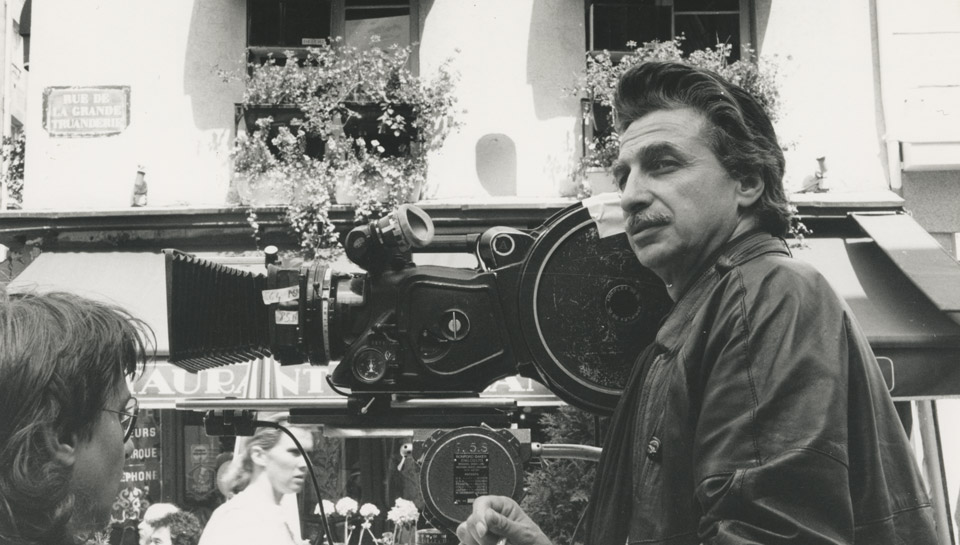Founded by the late French filmmaker Paul Vecchiali (1930 - 2023), Diagonale was a pioneering production company in the post-New Wave landscape of the 1970s and ‘80s. Though their work may be little-known in the United States, filmmakers and cinephiles who discover their world find ceaseless inspiration. Axelle Ropert, whose films were the subject of a recent New York City retrospective, continues Diagonale’s legacy. She has generously provided a primer for the uninitiated. Thank you to Nicholas Elliott for the translation.”
—Graham L. Carter, filmmaker and co-curator of Paul Vecchiali: Producer - From Jeanne Dielman to Diagonale with Bingham Bryant.
In French cinema, there’s one huge adventure everyone knows about: the New Wave.
But there’s also a lesser known one, whose importance continues to grow, and which must absolutely be shared abroad—notably in the United States, that dreamland of cinephilia.
Diagonale is an incredible story centering on an exceptional person: Paul Vecchiali, a great cinephile and visionary man who created a real adventure in French film production by working hard to gather around him a handful of filmmakers and atypical figures. This was in the 1970s, a tough decade during which mainstream French cinema was under a bourgeois-male-macho yoke, and where the only way of shooting quickly and with total freedom was to become an out-and-out pirate—by dodging rigid professional rules and slyly pooling the means of production.
Thanks to his sharp intelligence as a producer, Vecchiali brought together a few filmmakers who form something like a clandestine history of French cinema, and certainly one of its most beautiful: Jean-Claude Biette and his refined fictions woven from a thousand and one plots as giddy as they are coded; Jean-Claude Guiguet and his operatic dramas juxtaposing super-acute class relations with the most straightforward lyricism; Marie-Claude Treilhou, who scaled the same heights as Chantal Akerman’s Jeanne Dielman with her first feature Simone Barbès, ou la vertu; not to mention Gérard Frot-Coutaz…And Paul Vecchiali himself who in a certain way placed himself at the very heart of the French cinema of the 1970s with one film that rocked Pasolini (Femmes Femmes), another one that gave a devastatingly intelligent view of society (La Machine), and an unforgettable story of passion (Corps à coeurs).
What these films made by huge cinephiles, music lovers and, from a social perspective, “obscure” filmmakers have in common is an acute sense of class relations, a taste for heartrending lyricism inherited from Pagnol and Grémillon, an affection for actors as eccentric as they are brilliant (Hélène Surgère, Sonia Saviange, Jean-Christophe Bouvet), a confidence in the endless unfolding of dialogue, a love of popular chansons of the 1930s, a loathing for the routine screenplay, and an infinite trust in mise-en-scène, which “does everything.”
In the Diagonale films, it feels good to talk, sing, love, suffer, have bizarre affairs, strange relationships, secrets, and form communities with weird rules. It is neither an avant-garde (nothing experimental about their films) nor an officially subversive movement (they were all far too discreet to like narcissistic grand gestures) nor even an early LGBT utopia (the question of sexual identity did not mean much to them). Let’s say they were dissidents out of necessity and secretive by nature: since the system didn’t want them, they managed to invent a parallel system and world, but without shouting it from the rooftops.
Why have they been so important for filmmakers of my generation (me, Serge Bozon, Yann Gonzalez, Laurent Achard, Pierre Léon, maybe François Ozon)? Of course, the lyrical and political power of their films hit us full force. As well as their intelligence as cinephiles (since they cared so little for the fads that take up too much room in the film world).
But not just that. Probably because they were driven by a principle of social innocence (the idea of “career” made their skins crawl), because they were generous toward younger generations, and because their great intelligence never joined forces with cynicism, they encouraged us without knowing they did. In other words, they welcomed future filmmakers like us.
The Diagonale adventure was a revelation for us—it will be for you too.
—Axelle Ropert (filmmaker, co-president of La Société des Réalisatrices/Réalisateurs de Films)
Screening at Metrograph this weekend: the debut films of two key Diagonale figures (Jean-Claude Guiguet and Jean-Claude Biette), and the US premiere of a new restoration of the Isabelle Huppert and Delphine Seyrig led Aloïse by Liliane de Kermadec. Four films directed by Vecchiali himself will play in October.



